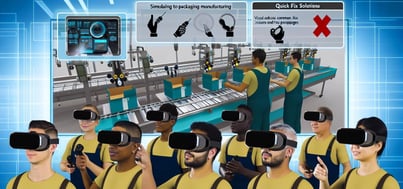Digital Training Simulations for Enhanced Workforce Skill Development
In packaging manufacturing, where production lines must operate at peak efficiency, the skill development of the workforce plays a pivotal role. With technological advancements shaping the landscape of industrial operations, it's crucial for companies to stay at the forefront of training methodologies to maintain competitive advantage.
One such breakthrough that has significantly transformed the training arena is the implementation of digital training simulations. These virtual platforms not only enhance learning experiences but also ensure a high retention rate of practical skills, essential for effective manufacturing operations.

The Evolution of Training in Manufacturing
Traditional training methods in manufacturing typically involve hands-on sessions and classroom-based instruction. While these approaches have their merits, they also come with limitations, such as high costs, inconsistent training quality, and considerable downtime for training setups. Moreover, the rapid evolution of manufacturing technologies and processes demands a more flexible and responsive training solution.
Digital training simulations represent a paradigm shift by offering an interactive and engaging way to train employees without the constraints of physical setups. These simulations use realistic 3D environments and scenarios that mirror actual factory settings, enabling workers to practice and hone their skills safely and efficiently.

Digital Training Simulations: Bridging the Gap
For packaging manufacturers, integrating cutting-edge ERP (Enterprise Resource Planning), SCM (Supply Chain Management), and MES (Manufacturing Execution Systems) like SAP, Oracle, Microsoft Dynamics, Kinaxis, Aveva, and others with advanced planning and scheduling software like PlanetTogether enhances overall operational efficiency. The seamless integration of these systems provides a robust framework for not only managing day-to-day operations but also for deploying effective training simulations.
Scenario-based Learning
One of the most effective aspects of digital simulations is scenario-based learning, which allows employees to experience complex situations that may occur on the production floor. This form of training is particularly beneficial in an environment where decision-making and problem-solving skills are crucial. By simulating various scenarios, from equipment malfunctions to supply chain disruptions, employees can learn to respond effectively without the risk of real-world consequences.
Real-time Feedback and Analytics
Digital simulations provide immediate feedback to trainees, an essential feature for accelerated learning and improvement. This feedback helps workers understand their mistakes in real-time and learn the correct methodologies on the spot. Additionally, training managers can use analytics to assess the performance of their workforce, enabling targeted training that addresses specific weaknesses.

Integration of ERP, SCM, and MES with Digital Simulations
The integration of ERP, SCM, and MES systems with digital simulations brings numerous advantages. By aligning simulation training with real-time data from systems like SAP, Oracle, or Microsoft Dynamics, employees can better understand the intricacies of these platforms in a controlled environment. Here’s how these integrations can enhance training outcomes:
Enhanced Familiarity with Systems
Employees can navigate complex software environments safely within a simulation, building their confidence and understanding of these systems without the fear of making costly mistakes in a live environment. This is particularly useful for onboarding new employees who need to get up to speed with company-specific systems.
Customized Training Modules
With insights derived from ERP and MES systems, training modules can be customized to address the specific needs of the workforce. For instance, if data from PlanetTogether's advanced planning and scheduling software indicates a bottleneck in a particular production line, training simulations can be tailored to address that specific issue.
Continuous Learning and Improvement
Integrations with ERP and MES systems allow for continuous updates to training modules based on evolving business needs and technological upgrades. This ensures that the workforce remains competent and proficient with current systems and practices.
As the packaging manufacturing sector continues to evolve, the importance of an efficient, skilled workforce cannot be overstated. Digital training simulations, especially when integrated with key ERP, SCM, and MES systems like SAP, Oracle, and Microsoft, offer a comprehensive solution that prepares employees for the complexities of modern manufacturing environments.
This approach not only enhances skill development but also aligns with the strategic objectives of reducing costs, improving quality, and accelerating production schedules.
Embracing digital simulations is a forward-thinking strategy that can significantly enhance the operational capabilities of any packaging manufacturing facility, ensuring it remains competitive in a rapidly changing industry landscape.
Are you ready to take your manufacturing operations to the next level? Contact us today to learn more about how PlanetTogether can help you achieve your goals and drive success in your industry.


